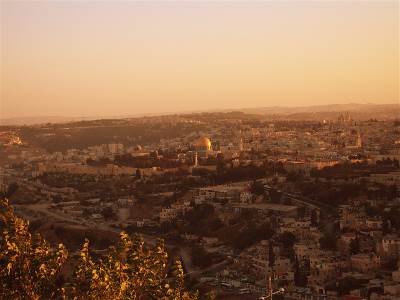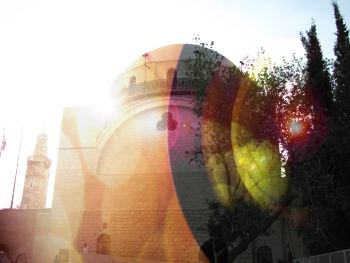Jerusalem of Gold
the most famous Jerusalem song
Jerusalem of Gold is the unofficial anthem of Israel and probably the most famous Jerusalem song.
You'll hear it on the radio, at concerts, on street corners and around campfires.
It was written by Naomi Shemer in 1967 and the song’s history plays a big part in its emotional impact.
Naomi wrote Jerusalem of Gold – in Hebrew, Yerushalayim Shel Zahav – for the Israel Music Festival of 1967, which took place the day after Israel’s 19th Independence Day celebrations. The melody was inspired by a Basque lullaby, but the lyrics describe the Jewish people’s longing for the holy city of Jerusalem.
 David Poe, cc-by-nd-2.0
David Poe, cc-by-nd-2.0At the time, Jerusalem was torn apart by war. The Old City was entirely in Jordanian hands, and Jordanian soldiers walked Jerusalem’s ramparts, firing daily at the Israeli homes at the foot of the walls. So despite Israel’s independence, the longing for Jerusalem and its holy cites remained a painful dream for most Jews.
The song was first performed a few days before the music festival, when Naomi sang it for Israeli troops. Almost overnight, Jerusalem of Gold became the unofficial hymn of the Israel Defense Forces.
Three weeks after the debut of the song at the music festival, the Six Day war broke out. On June 7, IDF paratroopers liberated the Old City of Jerusalem and were the first Jews to approach the Western Wall – Judaism’s holiest place of worship – in 19 years. They prayed, they cried … they sang Yerushalayim Shel Zahav.
When Naomi Shemer heard the soldiers had sung her song at this historic moment, she wrote an additional verse, recalling the blasts of the shofar from the Temple Mount that heralded the liberation of Jerusalem.
Since then, many artists have recorded the song, in Hebrew as well as other languages. Artists who have performed Jerusalem of Gold include, among many others:
- Shuly Nathan - who sang the song for Naomi at the Israel Music Festival in 1967
- Ofra Haza – this has perhaps become the definitive rendition of Yerushalayim Shel Zahav. Ofra performed the song at Israel’s 50th Independence Day ceremony in 1998, on Mount Scopus. Her classic recording of it is available on Disc 3 of her Greatest Hits collection. You can find the mp3 download of the song itself here.
- Demis Roussos - who sang it in English
- Rita Zarai, with French actor Patrick Bruel
- Phish – the song appears as the last few verses at the end of Demand, the last song on the album Hoist. Phish only sing the first three verses of Jerusalem of Gold, leaving out the last verse. You can find the mp3 download of Demand here.
Here is a video of Israeli troubadour Hezy Levy, performing Yerushalayim Shel Zahav.
Ask any Israeli – we all have our favorite memories associated with this
song. Mine is of an early summer evening I spent sitting under a tree
on Mount Scopus with several other fellow students from Hebrew
University, pretty much exactly where the photo at the beginning of this post was taken, and singing this song while someone played the guitar
and the sun set over the Old City.
Jerusalem of Gold & Schindler's List
Because the song is so much part of the Israeli national psyche, the producers chose it for the movie Schindler’s List.
Big mistake.
The song is featured at the end of Schindler’s List, as the music to which the remaining Jews leave the camp at the end of the war and walk over the hill to freedom.
If you saw the movie, this is probably the version you watched. (If you haven't seen the movie, watch it now!)
Israeli audiences were very disturbed by this. For Israelis, it is indelibly tied to the Six Day War and is totally unrelated to the Holocaust. Its use made the end of the movie a disconcerting, ridiculous anachronism that seemed silly, rather than triumphant. Audiences were so upset that after an initial flop, the movie was re-released in Israel with a different soundtrack that replaced the song with the Hanah Senesh song, Eli Eli.
Jerusalem > Jerusalem Song > Jerusalem of GoldDon't Miss What's New in Jerusalem!
Stay up-to-date with all that's new in Jerusalem and on this site. Subscribe to the RSS feed at the top of the navigation bar over on the left and you won't miss a thing.
And sign up for our free monthly newsletter to stay abreast of what's
going on, as well as new discoveries, seasonal events, cool Jerusalem tours and
exciting activities.
Subscribe to Our Newsletter
"As we had limited time in Jerusalem, I purchased your mini guide book and found it very informative. Thanks!" - Brian, S. Africa

Click here for the top 5 discount hotels in Jerusalem.


Recent Articles
-
Jerusalem of Gold: the Unofficial Anthem of Israel
May 22, 20 06:16 AM
-
Jerusalem Vacation Rentals
May 31, 19 09:46 AM
Jerusalem Video
6-min virtual tour





